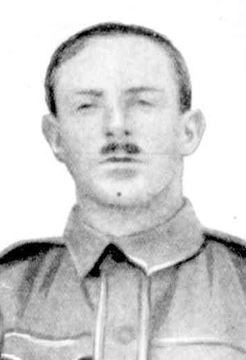CROLY, Arthur England Johnson
| Service Number: | Officer |
|---|---|
| Enlisted: | 17 August 1914 |
| Last Rank: | Captain |
| Last Unit: | 11th Infantry Battalion |
| Born: | Dublin, Ireland, 1 January 1882 |
| Home Town: | Perth, Western Australia |
| Schooling: | St Columba's College, Trinity College, Dublin University |
| Occupation: | Agent |
| Died: | Bunbury, WA, 3 June 1931, aged 49 years, cause of death not yet discovered |
| Cemetery: |
Bunbury General Cemetery, Bunbury, Western Australia Anglican Section B 306 |
| Memorials: | Kings Park Western Australia State War Memorial |
World War 1 Service
| 17 Aug 1914: | Enlisted AIF WW1, Captain, Officer, 11th Infantry Battalion | |
|---|---|---|
| 2 Nov 1914: | Involvement Captain, 11th Infantry Battalion, --- :embarkation_roll: roll_number: '10' embarkation_place: Fremantle embarkation_ship: HMAT Ascanius embarkation_ship_number: A11 public_note: '' | |
| 2 Nov 1914: | Embarked Captain, 11th Infantry Battalion, HMAT Ascanius, Fremantle |
Help us honour Arthur England Johnson Croly's service by contributing information, stories, and images so that they can be preserved for future generations.
Add my storyBiography contributed by Faithe Jones
Also served as Captain, Royal Irish Fusiliers.
LATE MAJOR A E. J. CROLY.
A SOLDIERLY RECORD:
Major Arthur England Johnson Croly, late of the Indian Army and the 11th Battalion, A.I.F., died suddenly at his home, Sampson Road, Bunbury oh Wednesday evening at the age of 49 years.
The deceased had been chopping wood during the afternoon and when lifting a rather heavy piece into place complained of pain in the body. He grew worse and the doctor was summoned but on arrival found him dead.
The late Major Croly was a prominent member of the Bunbury Sub Branch of the R.S.L., and noted for his ready wit. He was born in Dublin, Ireland, educated at St. Columba's College, Trinity College,
Dublin, and the Dublin University. He joined the Militia in 1898, served in the South African War (1899-1902) and was gazetted to the Regulars 1901. He served at Colenso, the Relief of Ladysmith,
Peter's Hill, Cugela Heights, and was mentioned in dispatches and wounded. He was with Gough's Mounted Infantry, as well as with his own battalion, 89th Princess Victoria's Royal Irish Fusiliers (Faugha-Ballagh). He proceeded to India early in 1903, where he held several staff appointments. He was the last Brigade Transport Officer, Malakand Nor-West Frontier after which he returned to regimental duty, where he was musketry instructor and in charge of the Machine Gun Detachments of his Regiment. He was then appointed Adjutant of his Regiment, and-relinquished this to become Acting Paymaster and subsequently became Assistant Commandant to the Mounted Infantry School, Signal Instructor to his Unit, and eventually re-joined the staff as Station Staff Officer, Amballa.
The late Major Croly left India in 1911 and joined the 87th or Home Battalion. He arrived in Australia in 1912, where, among other jobs he went on the land near Mingenew. Prior to the declaration of the Great War, he was engaged in the land, agency business. One of the first men to reach Blackboy Camp, he received his rank of Captain and was placed in command of "G" Company of the 11th Battalion and left with the first contingent on the Escaneous in October, 1914. After training in Egypt, he proceeded to Lemnos with the Brigade to which is unit was attached and landed in Gallipoli on the 25th of April and evacuated on the 28th. The only personal incident known of this period is the frustration of an attempt of a body of Turks who pretended to be Indians to gain en trance to the foremost trench, which was held by Captain Croly. He advanced to meet them, speaking Hindustani, of which they were ignornant, and quickly discovered the subterfuge and the attack was repelled.
After a period of some months in hospital at Alexandria, he was sent to England and, on becoming escent, was appointed D.A.A. Q.M.G. to General Sir Newton Moore on the formation of the A.I.F. Depots in U.K. On vacation of this appointment, he became Adjutant of No. 1 Command Depot, Perham Down, and subsequently he was promoted to the rank of Major, and appointed second in command of that depot. He was mentioned in dispatches at the landing by Sir Ian Hamilton, and afterwards recommended for the D.S.O. and granted a further mention in dispatches by Minister of Service in England. He attempted to get to France as second-in-command to Lieutenant Colonel Denton, D.S.O., who had asked for his services with the newly formed 70th Battalion, but after having passed one Board, was eventually deemed medically unfit owing to the injury of his right arm. He returned to Australia November 3, 1917, and proceeded to the Base Hospital, where he was operated on further.
A keen sportsman," Major Croly had shot everything from snipe to tiger, practised pig-sticking, followed racing and played polo and racquets.The funeral cortege left Messrs. W. Brittain and Son's mortiary at 3.80 p.m. on Thursday, headed by marching columns of ex-service men who proceeded to the Convent, corner and then around to the War Memorial, where the files opened out in two lines, between which the hearse passed. Files of ex-service men stood along each side of the cemetery road leading from the gate to the grave-side. Pall-hearers were Messrs. Welsh, Robin, Biggins, Murray, Gillett and Monaghan.
The remains were interred in the Anglican portion, the Rev. Hardy performing he last rites. The coffin covered with the Union Jack and D. Wallis sounded the last post. The late Major Croly leaves
a widow and two young children, a girl and a boy to mourn their loss.











